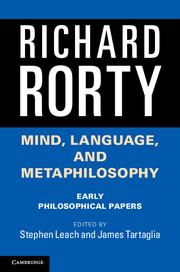Book contents
- Frontmatter
- Contents
- Foreword
- Acknowledgments
- Introduction
- 1 Pragmatism, categories, and language
- 2 The limits of reductionism
- 3 Realism, categories, and the “linguistic turn”
- 4 The subjectivist principle and the linguistic turn
- 5 Empiricism, extensionalism, and reductionism
- 6 Mind-body identity, privacy, and categories
- 7 Do analysts and metaphysicians disagree?
- 8 Incorrigibility as the mark of the mental
- 9 Wittgenstein, privileged access, and incommunicability
- 10 In defense of eliminative materialism
- 11 Cartesian epistemology and changes in ontology
- 12 Strawson’s objectivity argument
- 13 Verificationism and transcendental arguments
- 14 Indeterminacy of translation and of truth
- 15 Dennett on awareness
- 16 Functionalism, machines, and incorrigibility
- Index of names
- References
13 - Verificationism and transcendental arguments
Published online by Cambridge University Press: 05 June 2014
- Frontmatter
- Contents
- Foreword
- Acknowledgments
- Introduction
- 1 Pragmatism, categories, and language
- 2 The limits of reductionism
- 3 Realism, categories, and the “linguistic turn”
- 4 The subjectivist principle and the linguistic turn
- 5 Empiricism, extensionalism, and reductionism
- 6 Mind-body identity, privacy, and categories
- 7 Do analysts and metaphysicians disagree?
- 8 Incorrigibility as the mark of the mental
- 9 Wittgenstein, privileged access, and incommunicability
- 10 In defense of eliminative materialism
- 11 Cartesian epistemology and changes in ontology
- 12 Strawson’s objectivity argument
- 13 Verificationism and transcendental arguments
- 14 Indeterminacy of translation and of truth
- 15 Dennett on awareness
- 16 Functionalism, machines, and incorrigibility
- Index of names
- References
Summary
Many admirers of Wittgenstein’s Philosophical Investigations and of Strawson’s Individuals have taken the theme of both books to be an analysis of philosophical skepticism and their distinctive contribution to be a new way of criticizing the skeptic. This new way is summed up in a familiar passage from Strawson:
He [the skeptic] pretends to accept a conceptual scheme, but at the same time quietly rejects one of the conditions of its employment Thus, his doubts are unreal, not simply because they are logically irresoluble doubts, but because they amount to the rejection of the whole conceptual scheme within which alone such doubts make sense.
In an earlier period of analytic philosophy, the standard reply to the skeptic had been of the phenomenalistic Hume–Berkeley type. That is, the skeptic’s suggestion that what were usually taken to be material objects or other persons might merely be the content of his own consciousness – his own representations – was met with the reply that to have such-and-such representations just was to be seeing a material object or another person. This if-you-can’t-beat-him-join-him strategy, however, always (a) got shaky when “was” was questioned (did it mean “entailed”? “confirmed”?) and (b) had an unpleasant air of idealism about it, no matter how much it was claimed to be a “logical” rather than a “metaphysical” point. So when, on the heels of Austin’s attack on “the ontology of the sensible manifold,” Strawson revived the distinctively Kantian anti-idealist thesis that “inner experience requires outer experience,” the shift in strategy was welcomed. Strawson’s points about persons and material objects fitted together nicely with Wittgenstein’s “private-language argument” to suggest that the skeptics’ notion of a world of pure experience – a world containing nothing but representations – did not really make sense.
- Type
- Chapter
- Information
- Mind, Language, and MetaphilosophyEarly Philosophical Papers, pp. 260 - 270Publisher: Cambridge University PressPrint publication year: 2014
References
- 2
- Cited by



